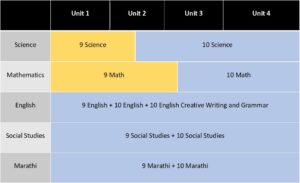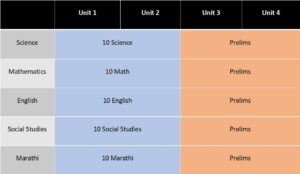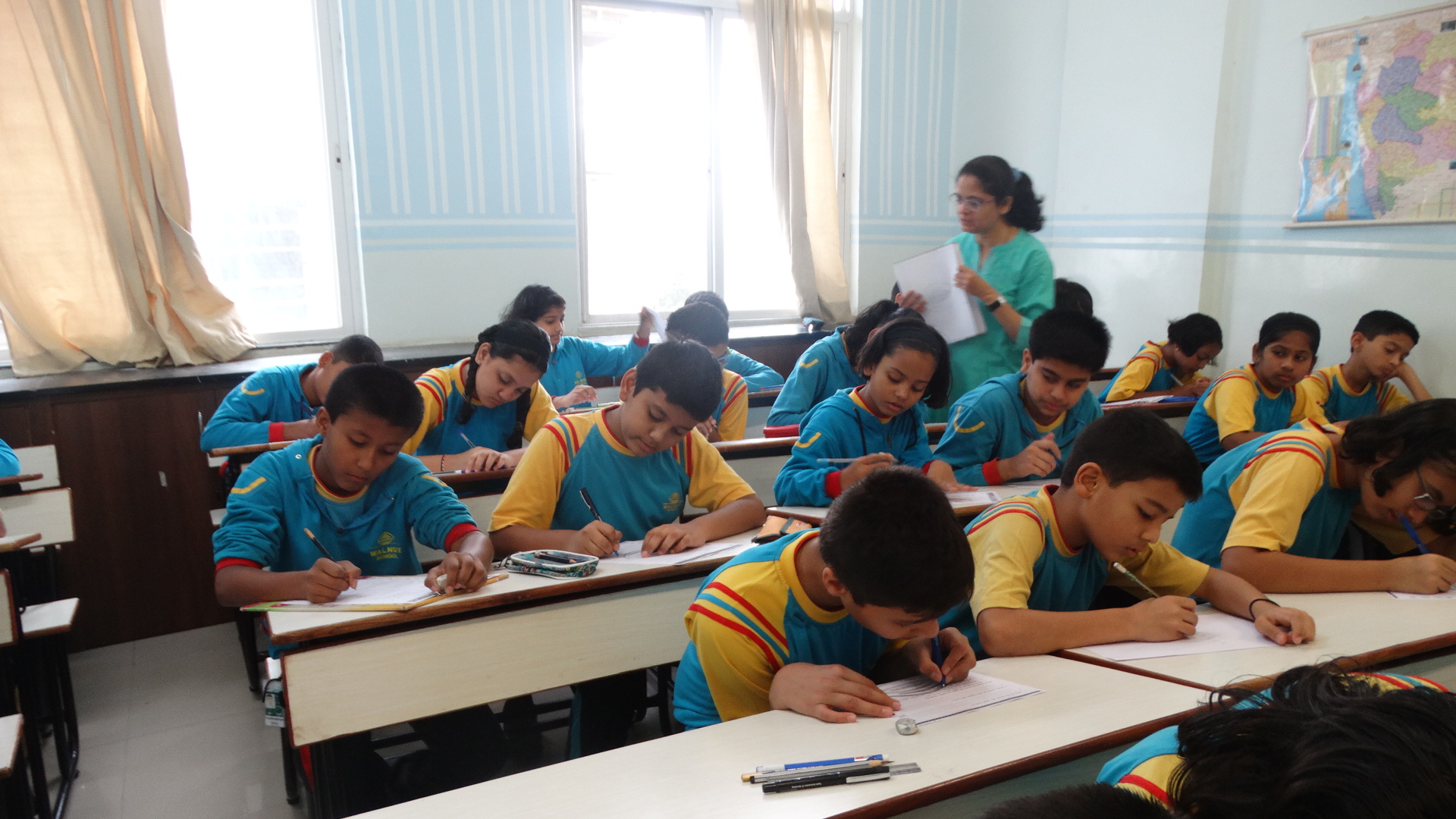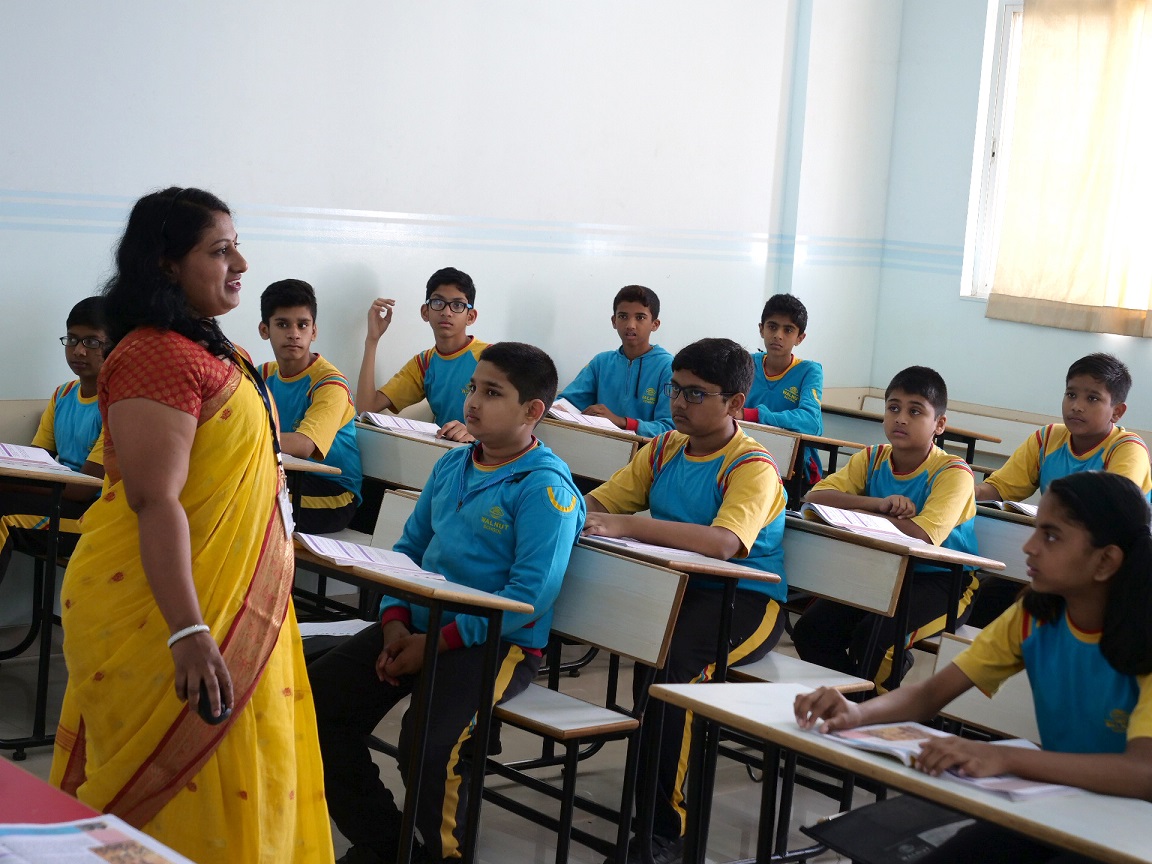Std. 9 Academic Program
Std. 9 Academic Program

Preparing for the Std. 10 board exams at Walnut School is a well-structured and systematic process. With one year remaining until the final run-up begins, students are provided with a comprehensive curriculum and expert guidance to excel in their exams.
Following RTE norms, all children are promoted from Std. 8 to Std. 9, but promotion to Std. 10 is solely based on the students’ exam performance. It is a challenge that requires dedication and hard work.
The Std. 10 CBSE board exams cover five core subjects and one skill subject, with comprehensive learning through in-school teaching of concepts. Writing work, including practice exercises and assignments, is primarily done at home, enabling students to reinforce understanding, develop skills, and cultivate self-discipline.
Here’s how the years ahead are planned academically.
Unit – wise planning : Std. 9

Unit – wise planning : Std. 10

Continuous Evaluations
Continuous Evaluations
Continuous evaluations play a crucial role in the board exam preparation approach. Special ‘try-a-test’ periods have been incorporated into the timetable to assess students’ knowledge and skills. The testing periods are scheduled as follows:
- Math ‘try-a-test’ period begins from Std. 7 onwards
- English and Social Studies from Std. 8 onwards
- Marathi and Science from Std. 9 onwards
During these testing periods, students have the opportunity to familiarize themselves with the exam format, practice time management, and evaluate their own performance. These tests are meticulously checked and discussed by the teachers, ensuring a thorough evaluation of the students’ understanding.
The question papers for all tests, including those leading up to Std. 10, are designed to match the difficulty level of the board exams. With the aim of challenging students and ensuring they have a strong understanding of the underlying concepts, questions may be twisted or unfamiliar questions added to these papers. To avoid panic and maintain a steady pace, students are encouraged to study systematically and daily.
Homework primarily consists of preparing for these tests, and it is essential for students to approach them with dedication and thoroughness. Absence on try-a-test days is discouraged, as overall attendance below 75% may impact eligibility for the board exams.

The aim of these tests is to facilitate studying and provide students with an advantage in their preparation.
In addition to the regular evaluations, chapter-wise Test Bytes are provided on Walmiki, serving as homework assignments once the chapter has been fully taught. These tests contribute to the internal assessment per subject, which also includes factors such as file submission, journals/projects, class participation, attendance, and overall behavior.
How will we be preparing for Std. 10?
How will we be preparing for Std. 10?
English
- Early introduction to functional English : From Std. 1 onwards, we introduce students to Functional English, emphasizing regular usage of the language. This early introduction enables students to grasp and express themselves in English earlier than their peers. Despite the increase in chapter length, the overall difficulty level of English chapters remains relatively the same from Std. 7 to Std. 10. As a result, we are able to teach the textbooks almost an entire academic year in advance.
- Unseen comprehensions: As part of their practice, students solve unseen comprehensions. The questions in these comprehensions are meticulously designed to align with the paper pattern, enabling students to develop the skill of finding answers in unseen passages.
- Functional grammar: The curriculum incorporates concepts of functional grammar that hold relevance in everyday usage. Students are given ample practice in instinctively completing sentences and identifying errors through the use of multiple-choice questions (MCQs).
- Creative writing: Students are taught one creative writing topic per unit. As they progress, the difficulty level increases, encouraging them to think critically and express their thoughts in English.
- Comprehensive textbook reading: Starting right from Std. 8, students read and understand each chapter from both English textbooks. This approach ensures that no chapter is rushed through and enhances their understanding.
- Board-format worksheets: The worksheets feature a mix of different types of textbook-based questions, aligning with the format of board exam questions. This prepares students effectively for the exam.
Marathi
- Early Introduction to Std. 10 textbook: The teaching of the Std. 10 textbook commences from Std. 9, specifically starting with Unit 1. This strategic approach enables students to develop early familiarity with the content and concepts, providing them with a valuable head start in their preparation.
- Marathi unseen comprehension practice: To enhance comprehension skills, we utilize the Std. 9 Marathi textbook, Aksharbharati (SSC), for unseen comprehension practice. This helps students develop their ability to understand and interpret unfamiliar passages effectively.
- Mixed grammar practice: Mixed grammar practice is provided to students in order to revise and reinforce important concepts. This approach ensures that students develop a strong foundation in grammar and are able to apply the rules accurately in their written work
- Creative writing teaching and revision: In each unit, the focus is on teaching and revising creative writing skills. This approach allows students to develop their creativity, refine their writing style, and effectively express their thoughts and ideas.
Science
- Building upon concepts from Std. 7: The syllabus for Std. 8 is designed to build upon the concepts covered in Std. 7. It is important to understand that the learning process is continuous, and concepts from previous years serve as the building blocks for higher-level understanding.
- Thorough teaching of Std. 9 Chapters: The approach at Walnut School ensures that all the chapters of Std. 9 are taught comprehensively during the Std. 8 academic program. This method aims to provide students with a strong foundation and in-depth knowledge of the upcoming curriculum. By covering the Std. 9 chapters thoroughly in Std. 8, students have the opportunity to stay ahead and become acquainted with the content well in advance.
- Clearing basic concepts: The emphasis is placed on clearing basic concepts right from Std. 8. It is recognized that waiting until Std. 10 to begin focusing on these concepts may result in gaps in understanding. By proactively addressing and strengthening fundamental concepts at an earlier stage, students are able to establish a solid foundation for their future learning.
Mathematics
- Consistency in syllabus: Starting from Std. 6, the syllabus remains largely the same. However, certain chapters may introduce new concepts, while others may increase in difficulty. Our approach ensures that students are exposed to both new concepts and challenging topics during the Std. 8 academic program.
- MCQs and worksheets: To enhance understanding and application of concepts, MCQs and worksheets include some questions combining various concepts. These help students develop a comprehensive understanding of the subject matter and improve their problem-solving skills.
- Maximum exposure to combinations of questions: We strive to provide students with maximum exposure to different combinations of questions. By offering a variety of question formats and combinations, we ensure that students are well-prepared to tackle different types of questions in the Std. 10 board exams. Our technology backbone enables us to generate numerous tests on the fly with varying difficulties, across chapters, with different weightage for important questions etc. That gives our students a great platform to get rid of their fear for exams and also to get used to tricky questions.
Social Studies
- Equal emphasis: Social studies comprises four subjects, with each subject’s textbook carrying a 25% weightage in the Board paper pattern. Therefore, no textbook can be taken lightly, and equal emphasis is given to all subjects.
- Comprehensive timeframe: To ensure thorough preparation,1 ½ years are allocated to the completion of the entire portion. This time frame allows for ample time for revisions and prelim exams in Std. 10.
- History: In the history subject, all relevant chapters from both Std. 9 and Std. 10 are taught in parallel. This approach highlights the connections between certain historical events, and the order of chapters in both textbooks has been rearranged accordingly.
- Geography: The concepts covered in Std. 9 and 10 geography textbooks build upon the foundations laid in Std. 6 to 8. Students are exposed to map reading, labeling, and marking exercises to familiarize themselves with the Indian map.
- Political Science: Similarly, in political science, both Std. 9 and 10 textbooks are taught together. Each relevant chapter from Std. 9 is followed by its corresponding chapter in the Std. 10 textbook. This approach facilitates a seamless understanding of political concepts.
- Economics: The economics textbook includes various relevant assignments that engage students in hands-on activities. These assignments are given to enhance students’ understanding of economic concepts through practical application.

Std. 10 Prelims
- Comprehensive Completion: The entire portion of the Std. 10 syllabus is covered by the end of Unit 2 in Std. 10. This ensures that students have ample time for revisions and preliminary exams.
- Prelim Rounds: After completing Unit 2, five rounds of prelims are conducted to provide students with extensive practice and preparation for the board exams.
- Gradual Progression: Prelims 1 and 2 focus on 50% of the syllabus, allowing students to ease into the full-length exam format. This gradual progression helps them adapt and build confidence.
- Full-Portion Practice: Prelims 3, 4, and 5 are based on the complete syllabus. These rounds provide students with the opportunity to gauge their overall understanding and readiness for the board exams.

With one year remaining, Walnut School focuses on core and skill subjects, offers continuous evaluations, and provides valuable resources like chapter-wise Test Bytes. The comprehensive curriculum and expert guidance offered at Walnut school ensure student success. Emphasizing daily studying and well-rounded growth, Walnut School sets students up for academic excellence.